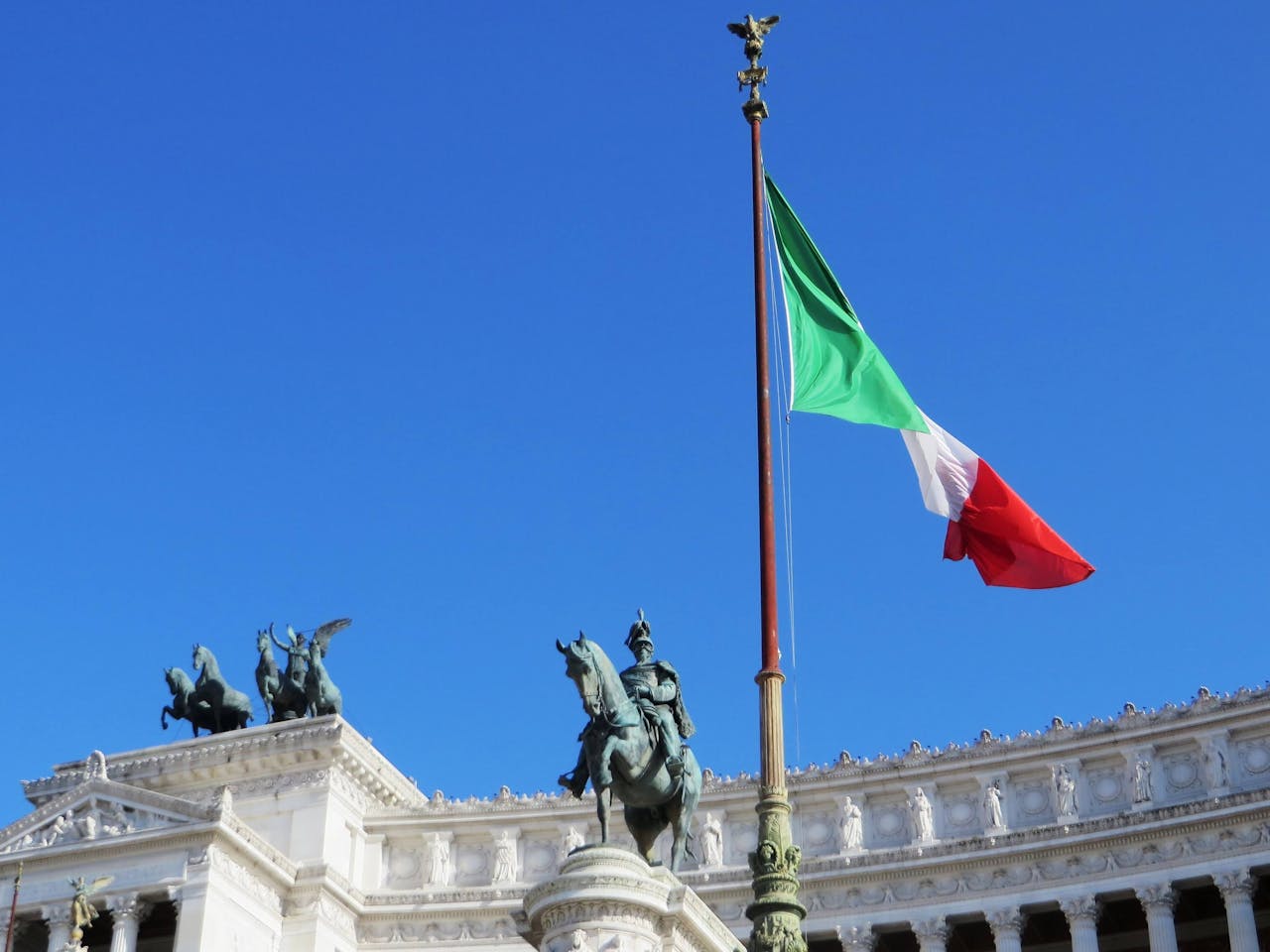When applying for dual Italian citizenship, the choice between a consular application and a court case depends on various factors, such as personal circumstances, documentation availability, and, in some cases – your preference. Before we start dissecting each of these application processes, let’s find out whether you are eligible for citizenship in the first place.
Italian Citizenship Eligibility Criteria
Even though Italian citizenship eligibility criteria, just like the application itself, depends on various factors, they are primarily centered around ancestry and legal requirements. If you are thinking about applying for dual Italian citizenship, by now, you might have met face-to-face with some of these criteria.
Eligibility for Italian dual citizenship
Eligibility for Italian dual citizenship usually extends to individuals with Italian ancestors, such as parents, grandparents, or even great-grandparents, enabling citizenship transmission through descent. Specific rules apply to this citizenship transmission, also known as Jure Sanguinis, based on the ancestral lineage and timing of important life events, such as birth, marriage, naturalization, and more. There are two paths your citizenship journey can take:
Legal recognition – Italian courts can recognize citizenship through legal actions, oftentimes related to the interpretation of citizenship laws, such as the ‘1948 Rule’ cases.
Administrative recognition – Obtaining citizenship through administrative channels, such as consulates or local authorities, is achievable by meeting specific documentation and procedural requirements.
Let’s explore the requirements for each of these two citizenship paths, assuming you are applying for citizenship by descent.
Consular Application Eligibility
Consular eligibility greatly depends on your ability to prove not only your Italian heritage, but also an uninterrupted line of citizenship. In the world of consular applications, the go-to route is often claiming citizenship by descent (Jure Sanguinis). As for the proving part, it is done by enclosing the paperwork required by the consulate to which you are applying. Wondering how to ‘choose’ the consulate you will be applying to? No worries here, as this is predetermined by your legal residence; and to which consular jurisdiction it belongs.
Once you have nailed down the logistics of your citizenship application, it is important to remember some basic requirements granting your consular application a success:
- Your Italian ancestor was alive at the time of Italy’s unification (March 17, 1861).
- Your Italian ancestor did not naturalize to any country before July 1, 1912 – or before the birth of his descendants!
- If the Italian ancestor was born before January 1, 1948, citizenship can only be claimed through the father’s line. If born to a woman, the case can only be successful through a judicial procedure!
Not sure if you qualify for a consular application? Check out the court case eligibility before throwing in the towel!
Court Case Eligibility
Qualifying for Italian citizenship through a court case typically involves specific legal rulings, notably those related to the ‘1948 Rule’ we briefly touched upon earlier.
What is the 1948 Rule?
Historically, women faced challenges in passing down citizenship according to Italian law, which initially granted this privilege only to men. However, amendments to the Italian constitution expanded citizenship transmission rights to descendants born after January 1, 1948, through both Italian men and women. Still, to support cases where children were born to women before this amendment, applicants need to join the ‘court case’ club.
What is the 1912 rule?
Another important rule, often referred to as the ‘1912 rule,’ plays a significant role in determining eligibility for citizenship recognition. This law essentially states that an Italian citizen who naturalized in another country before July 1, 1912, automatically lost their Italian citizenship upon naturalization which caused the loss of citizenship of the entire family. The court case typically involves proving that his spouse was naturalized involuntarily – against her will – presenting historical records and citizenship laws to demonstrate the child’s and descendants’ entitlement to Italian citizenship despite the pre-1912 naturalization of their male ancestor.
Still unsure if you qualify for the court case route? Why not fill out our eligibility check form and let us clear up your doubts? After all, we’re here to do the thinking while you enjoy this once-in-a-lifetime experience.
Exceptions and special cases
Your eligibility isn’t a lost cause just because you don’t have an Italian-born nonno. There are numerous other avenues to build your case for application. For instance, foreign nationals married to Italian citizens may qualify for Italian citizenship through marriage (Jure Matrimonii), subject to conditions like marriage duration, residency, language proficiency, and more.
Another example is based on residency, as individuals who have legally resided in Italy for a specified period may also be eligible for citizenship. When it comes to children adopted by Italian citizens, they may acquire Italian citizenship through adoption.
In extremely limited and rare cases, even individuals born on Italian territory may be eligible for Italian citizenship by birthright. However, it is important to keep in mind that Italy does not practice jus soli (citizenship granted based on being born on Italian soil), so make sure to double-check the requirements for this specific process.

Italian Citizenship via Consular Application
Alright, let’s break it down. So far, we know we’ve got two avenues to Italian citizenship: the consular route and the court case route. No matter which path your case takes, the chances are – your Italian passport is just around the corner. And we are here to show you what that walk around the corner really looks like. Let’s zoom in and check out the specifics of each of these applications.
Consular Citizenship Application
While the consular application process may appear straightforward at first glance, there are still some twists and turns to navigate before you can relax comfortably. These nuances often come with experience, but since we are all about open-sourcing knowledge – here are a few key points to remember when pursuing citizenship recognition through the Italian consulate:
- Understand eligibility criteria – before starting the process, make sure you meet the eligibility criteria for Italian citizenship recognition. If unsure, reach out to your online community or a citizenship specialist.
- Check consular jurisdiction – determine which Italian consulate has jurisdiction over your place of residence, as you’ll need to apply through the consulate that serves that area.
- Follow consular guidelines – since each consulate may have specific guidelines, familiarize yourself with these to avoid any delays or rejections of your application.
- Gather required documents – and remember to ensure these are accurate, up-to-date, and legalized as per consulate requirements.
- Stay informed and updated – keep yourself informed about any changes in consulate procedures, requirements, or regulations. In other words: regularly check the consulate’s website.
- Seek professional assistance if needed – the recognition process can take time. Being patient and prepared for difficulties and obstacles during the application process is crucial. Professionals can provide guidance and advice tailored to your specific situation.
Now that we’ve got a handle on these key points let’s put our newfound knowledge into action with some tangible examples.
Italian Consulate Process
Imagine you are gearing up to kick off your citizenship journey by applying for Italian citizenship through descent at the Italian consulate in the US. Living in Illinois, you are in the jurisdiction of the Chicago consulate, making it your go-to destination for any information you’re curious about.
Your first move is to read through the official webpage of the Chicago consulate. Filled with information on citizenship, including eligibility criteria and the documents you’ll need to support your application – their Instructions file has it all. In this example, you are applying through your paternal grandfather as your main Italian ancestor, so naturally, you will focus on the details under Category No. 3 within the Instructions file on their ‘Italian citizenship through ancestors (Iure Sanguinis)’ page. Next step? Securing yourself a citizenship appointment.
Consulate Appointment
Securing your citizenship appointment in Prenot@mi is something we’ve covered extensively in our “How to Book Your Citizenship Appointment with the Italian Consulate” article. And since consulates typically operate on an appointment-only basis for citizenship applications, it is only natural that each adult applicant over the age of 18 needs their own citizenship appointment.
However, we can’t stress this enough: Consular requirements may vary significantly from one consulate to another. While some consulates may, for example, permit multiple family members to attend a single appointment, others may have stricter policies in place. That’s why it is crucial to stay informed and keep your finger on the pulse of the latest updates.
These appointments are in high demand and are released periodically, often during specific times of the day and month. Due to the popularity of dual citizenship applications, appointment slots can fill up quickly and are sometimes released months ahead. To stay ahead of the curve, it is recommended to verify appointment availability through online resources or directly with the consulate.
Typically, citizenship appointments are scheduled well ahead of time. However, on occasion, they may only become available a couple of months beforehand. In such instances, it’s wise to prioritize gathering all required documentation over immediately booking your citizenship appointment. This ensures you won’t risk missing your appointment due to incomplete paperwork.
Keeping the proactive approach of staying connected with relevant online communities, consulting with your citizenship specialists, or directly contacting the consulate can ensure you’re abreast of any changes in appointment procedures.
Once you’ve successfully booked your citizenship appointment, it’s time to prepare by gathering all the documentation outlined by the consular requirements.
Consulate Interview
While collecting your documentation, you might be wondering as to what the interview looks like. The purpose of this interview is to verify the authenticity of your application and documents. This means that, during your encounter with the consular clerk, you can expect them to review your documents and ensure they comply with Italian citizenship laws.
You also might be asked about your family lineage and the Italian ancestors through whom you are applying for citizenship, so be prepared to provide detailed information about your heritage. Although very rare, some consulates may even conduct a basic Italian language and culture assessment involving a simple conversation about Italian history and traditions. More commonly, though, the consular clerks ask for clarification or additional details regarding certain aspects of your application.
Result? If everything is in order and the consulate is satisfied with your application, you will be asked to sign the necessary paperwork to proceed with your recognition process. Alternatively, you may receive instructions on additional steps required to complete your application. And at this point, we feel it is important to note that your application was not rejected in such circumstances, but was only delayed until all the documentation requirements were completed.
Consulate fees
As you explore the consular resources, you’ll stumble upon details about the application fee – a crucial aspect of the citizenship process. According to Italian Law 89/2014, applicants must pay a 300 euros fee for their citizenship application. This amount is recalculated quarterly into USD and updated on the consulate’s official webpage to keep pace with currency fluctuations.
For the period from January 1 to March 31, 2024, the fee stands at 322.10 US dollars. Payments are usually accepted in the form of cashier’s checks or money orders payable to the respective consulate.
In addition to these processing fees, it’s important to consider the costs associated with collecting, legalizing, and translating these documents, as well as any in-between steps like amendments, court orders, or certification of translations. If you’ve hired a consultant company to assist with your citizenship application, remember to budget for this additional expense as well.
Italian Citizenship via Court Case
Suppose you’ve confirmed your eligibility to begin your Italian citizenship journey, diligently gathering all the required records… When suddenly, you discover that your primary Italian ancestor – your great-grandmother – gave birth to your grandmother in 1947 rather than 1949. Instead of feeling discouraged, this scenario presents an opportunity to navigate the judicial route and retrospectively prove that your grandmother could, indeed, carry on her Italian citizenship regardless of her birth date. Let’s see what that experience looks like.
Who Is Eligible To Apply For Italian Citizenship Via a Court Case?
While court cases may seem like the path for more complex situations, it is essential to carefully assess your circumstances and seek advice from legal professionals or specialized citizenship experts to determine the best path for your dual Italian citizenship application.
That said, since the consular process is usually more straightforward – naturally being administrative rather than judicial – applicants often explore the court case option only when a consular application isn’t feasible. If you’re unsure whether your case falls under the judicial category, consider asking yourself the following questions:
- Did your Italian male ancestor acquire US citizenship before the birth of his descendants?
- Do you have a female Italian ancestor who naturalized involuntarily, through marriage?
- Did your Italian female ancestor marry a non-Italian man before 1948?
If any of your answers to these questions are “yes,” you may still be eligible for dual Italian citizenship, but through the court case route.
How to get your Italian Citizenship through the Italian courts
Just as with your standard consular application, your first move is to gather all your documentation. Regardless of the application type, the mission always remains the same: prove your Italian heritage and an uninterrupted line of citizenship.
Unlike the consulate route, no appointment scheduling is necessary here. Once you’ve rounded up all your paperwork, it is time for your legal representative to swoop in and file that lawsuit. Handing over months of hard work and personal information to an attorney you’ve never met before can seem quite daunting. Many people consider finding a reliable professional on their own to be one of the most challenging aspects of the lawsuit application process. To avoid such negative experiences, we at La Dolce Vita take care of all your application preparation, and once it’s time to secure legal representation – we proceed with our trusted Italian attorney who handles citizenship cases in Italian courts on our behalf. That’s how we guarantee your citizenship case is always in good hands, from start to finish.
At this point, the court will dive into your case in line with Italian citizenship laws and historical records, and after weighing the evidence and arguments, they will render a decision on your claim. Essentially, this marks the phase where you will most likely secure your Italian passport. Pretty convenient, isn’t it?
Legal fees for court cases
When it comes to filing a lawsuit, there are certain legal fees to keep in mind besides the ones of your hired attorney. The filing fee for initiating the lawsuit amounts to €545. Additionally, there are costs associated with obtaining copies of the final judgment, which amount to around €35 per copy. It’s important to factor in these fees when considering the overall expenses of pursuing citizenship through a court case.
Is This The Fastest Way To Get Italian Citizenship
In short – yes, it might be. Pursuing Italian citizenship through a court case can be the fastest option, and there are several reasons for this. Firstly, previously, the Court of Rome was the sole jurisdiction in Italy handling Citizenship by descent cases. However, as of the new law in effect from June 22, 2022, for plaintiffs residing abroad, jurisdiction now lies with the court in the town of birth of the Italian ancestor. This change significantly reduced waiting times.
Secondly, individuals gain the right to apply for Italian citizenship through a lawsuit if the Italian consulate cannot provide an appointment within 2 years. Considering the challenges of booking consulate appointments due to high demand, opting for a court case may indeed become your preferred route!
To confirm whether this route would be the fastest and most appropriate for your application, feel free to reach out to us.





